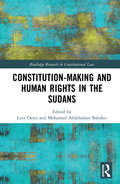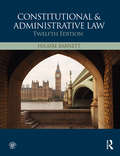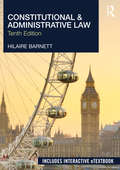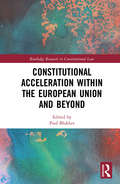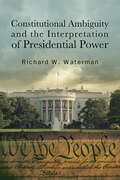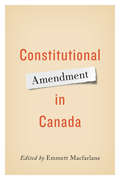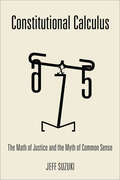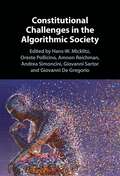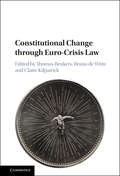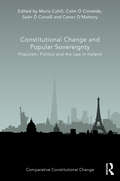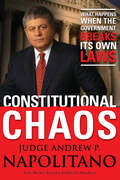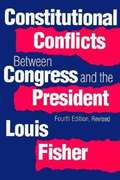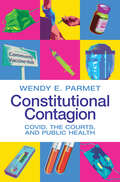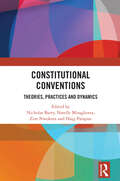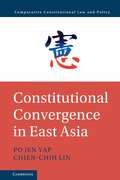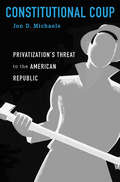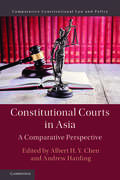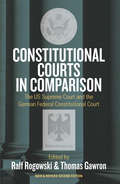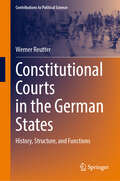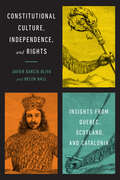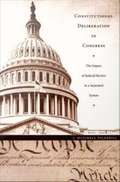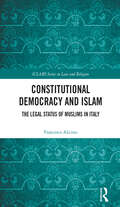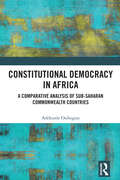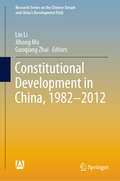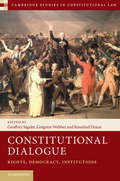- Table View
- List View
Constitution-making and Human Rights in the Sudans (Routledge Research in Constitutional Law)
by Lutz Oette Mohamed Abdelsalam BabikerSudan and South Sudan have suffered from repeated cycles of conflict and authoritarianism resulting in serious human rights and humanitarian law violations. Several efforts, such as the 2005 Comprehensive Peace Agreement and transitional justice initiatives have recognized that the failure to develop a stable political and legal order is at the heart of Sudan’s governance problems. Following South Sudan’s independence in 2011, parallel constitutional review processes are under way that have prompted intense debates about core issues of Sudan’s identity, governance and rule of law, human rights protection and the relationship between religion and the State. This book provides an in-depth study of Sudan’s constitutional history and current debates with a view to identifying critical factors that would enable Sudan and South Sudan to overcome the apparent failure to agree on and implement a stable order conducive to sustainable peace and human rights protection. It examines relevant processes against the broader (constitutional) history of Sudan and identifies the building blocks for constitutional reforms through a detailed analysis of Sudanese law and politics. The book addresses constitutionalism and constitutional rights protection in their political, legal and institutional context in Sudan and South Sudan, and the repercussions of the relationship between state and religion for the right to freedom of religion, minority rights and women’s rights.
Constitutional & Administrative Law
by Hilaire BarnettHilaire Barnett’s Constitutional and Administrative Law has provided generations of students with reliable, accessible and comprehensive coverage of the Public Law syllabus. Mapped to the common course outline, it equips students with an understanding of the constitution’s past, present and future by analysing and illustrating the political and socio-historical contexts which have shaped the major legal rules and principles of public law, as well as on-going constitutional reform. The 12th edition will address key recent developments including: The referendum result on the UK’s membership of the EU and its ongoing impact on constitutional and administrative law The continuing process of devolution to the nations Terrorism and national security Future developments, particularly in relation to 'Brexit' will be discussed in regular updates to the companion website.
Constitutional & Administrative Law
by Hilaire BarnettThis highly-respected textbook is regularly updated to provide complete coverage of the Public Law syllabus and is accompanied by a range of interactive resources designed to support teaching and learning. Mapped to the common course outline, it equips students with an understanding of the constitution’s past, present and future by analysing and illustrating the political and socio-historical contexts which have shaped the major rules and principles of public law, as well as on-going constitutional reform. The new 10th edition has been revised and updated to reflect recent developments in the law including the Defamation Act 2013, Crime and Courts Act 2013 and the Justice and Security Act 2013 and has been enhanced to meet the needs of students and lecturers working in today’s digital world. In addition to the printed textbook users receive access to an enhanced electronic version. The interactive eTextbook brings the benefits of digital to the text – searching, online, offline and mobile access, interactive exercises and note-sharing are just some of the newly integrated features. Key features of the interactive electronic textbook One-click access to the cases on LexisNexis and the statutes on the government’s legislation archive with almost 1,000 embedded hyperlinks in the text The most-up-date book available with author updates twice a year to key developments in Public law End of chapter interactive exercises which enable students to assess their understanding and progress and diagnose areas of weakness An Interactive timeline that provides instant access to essential context on how the constitution has developed historically and politically to the present day A comprehensive bank of essay questions with outline answers to help students prepare for assessments The ability to make notes and highlight key sections of the text and to share your notes with the class Instructor ResourcesA companion website will help instructors integrate the textbook with their teaching and includes links to further reading for students: Access to articles on constitutional and administrative law from The Student Law Review All of the diagrams from the text, ready to be integrated with your teaching Chapter-by-chapter customisable PowerPoint slides which can be used in seminars or lectures A bank of multiple choice questions which can be customised and adapted for formative assessment Weblinks curated by the author in a read-to-click format Please register to gain access to the Instructor’s eResource on www.RoutledgeInteractive.com Further information about the interactive electronic textbook Author Updates twice a year As the law changes, so does the interactive eTextbook. Updates will go live in the Interactive eTextbook and can be downloaded from the Instructor eResource. Hyperlinked citations embedded in the text Students will have one-click access to the full text of cases on LexisNexis® and to statutes on the government’s legislation archive End of chapter assessments and quizzes Hundreds of interactive multiple-choice exercises to encourage students to test their understanding of the key concepts Anytime, anywhere access Made possible by a partnership between Routledge and VitalSource®, your interactive eTextbook is accessible via VitalSource’s Bookshelf - the most used eTextbook platform in the world. Bookshelf makes digital reading possible online, offline as a download or on mobile devices in native apps as well as browsers. Please see the help section if you encounter any difficulties in pairing devices or accessing your eTextbook on your preferred device. Notes It’s easy to add notes and save them in the cloud, these can be synchronised across devices. Online help is built into Bookshelf®. Notes can be used privately or to share comments on the text with a group. This means comments and notes from lectures or seminars can move from instructor to student, student to instructor and student to student.
Constitutional Acceleration within the European Union and Beyond (Routledge Research in Constitutional Law)
by Paul BlokkerModern constitutionalism as an idea and practice is facing great uncertainty in current times. Scholarly debates focus predominantly on constitutions beyond the state, while the predicament of domestic constitutionalism is much less considered. This volume contributes to a theoretically informed analysis of the key challenges and changes affecting domestic constitutionalism in Europe and beyond, departing from the idea of ‘constitutional acceleration’ or the increased propensity of different actors to engage in (formal) reform of the constitutional order. The volume points to a fundamental change in the function of constitutions in that constitutions themselves are increasingly subjects of political contestation rather than framing political debates. The collection of essays addresses a range of critical challenges – including societal acceleration, depoliticization, civic engagement, multi-faceted constituent power, modernization, populism and nationalism, and transnationalization. The volume includes a variety of disciplinary, and in some cases interdisciplinary, approaches, including (political) sociology, political science, constitutional law, and constitutional and legal theory, and will be of interest to researchers and students in any of these areas. Case studies focus on the EU and the wider European context, and include highly relevant but little known or ill-understood cases, such as the recent constitutional events in Iceland, Italy, or Romania, and cases of democratic reversal, such as Hungary, while also engaging with traditional but rapidly changing cases of constitutional interest, such as the UK.
Constitutional Ambiguity and the Interpretation of Presidential Power (SUNY series on the Presidency: Contemporary Issues)
by Richard W. WatermanExamines the role of constitutional ambiguity across the entire spectrum of American history and how it impacts our interpretation of presidential power.While the rise of autocratic presidential powers has been widely noted by scholars in recent years, with calls by some for a stronger or more accountable presidency, Constitutional Ambiguity and the Interpretation of Presidential Power is among the first entirely dedicated to a study of the impact of this ambiguity on how scholars, judges, and presidents have understood executive power. Embarking on a detailed examination of legal, historical, and political science literature across the broad scope of American history, Richard W. Waterman examines the concerns of the Constitution's Framers regarding the fear of monarchy and a tyrannical president. He then discusses the writing and ratification of the Constitution and by drawing on insights from the time of the Framers to the present day, he provides a unique historical timeline related to the discussion and analysis of constitutional ambiguity. Over the course of several chapters, he finds that no sole theory defines presidential power, and ambiguity rules the day, allowing presidents to find power in the Constitution's silences as well as its various nooks and crannies, which has led to the very real danger of an autocratic presidency.
Constitutional Amendment in Canada
by Emmett MacfarlaneIn Canada, the 1982 Constitution Act contains the amending formula, which outlines a set of procedures required to make changes to the constitution. Recent debates over Senate reform, the status of the Supreme Court of Canada, and the rules governing royal succession have highlighted how important the amending formula is in maintaining the vitality and relevance of the governing system. Constitutional Amendment in Canada is the first volume to focus solely on the implications of the amending formula in Canada. Emmett Macfarlane has brought together a group of expert authors to address such topics as the difficulties of constitutional reform, the intersection of various levels of government and the judiciary, and the ability of the public to veto proposed changes. Filling a serious gap in the literature, Constitutional Amendment in Canada is an authoritative study of the historical and contemporary implications of the amending formula.
Constitutional Calculus: The Math of Justice and the Myth of Common Sense
by Jeff SuzukiHow math trumps tradition in promoting justice, fairness, and a more stable democracy.How should we count the population of the United States? What would happen if we replaced the electoral college with a direct popular vote? What are the consequences of allowing unlimited partisan gerrymandering of congressional districts? Can six-person juries yield verdicts consistent with the needs of justice? Is it racist to stop and frisk minorities at a higher rate than non-minorities? These and other questions have long been the subject of legal and political debate and are routinely decided by lawyers, politicians, judges, and voters, mostly through an appeal to common sense and tradition.But mathematician Jeff Suzuki asserts that common sense is not so common, and traditions developed long ago in what was a mostly rural, mostly agricultural, mostly isolated nation of three million might not apply to a mostly urban, mostly industrial, mostly global nation of three hundred million. In Constitutional Calculus, Suzuki guides us through the U.S. Constitution and American history to show how mathematics reveals our flaws, finds the answers we need, and moves us closer to our ideals. From the first presidential veto to the debate over mandatory drug testing, the National Security Agency's surveillance program, and the fate of death row inmates, Suzuki draws us into real-world debates and then reveals how math offers a superior compass for decision-making. Relying on iconic cases, including the convictions of the Scottsboro boys, League of United Latin American Citizens v. Perry, and Floyd v. City of New York, Suzuki shows that more math can lead to better justice, greater fairness, and a more stable democracy. Whether you are fascinated by history, math, social justice, or government, your interest will be piqued and satisfied by the convincing case Suzuki makes.
Constitutional Challenges in the Algorithmic Society
by Giovanni Sartor Andrea Simoncini Hans-W. Micklitz Oreste Pollicino Amnon Reichman Giovanni De GregorioNew technologies have always challenged the social, economic, legal, and ideological status quo. Constitutional law is no less impacted by such technologically driven transformations, as the state must formulate a legal response to new technologies and their market applications, as well as the state's own use of new technology. In particular, the development of data collection, data mining, and algorithmic analysis by public and private actors present unique challenges to public law at the doctrinal as well as the theoretical level. This collection, aimed at legal scholars and practitioners, describes the constitutional challenges created by the algorithmic society. It offers an important synthesis of the state of play in law and technology studies, addressing the challenges for fundamental rights and democracy, the role of policy and regulation, and the responsibilities of private actors. This title is also available as Open Access on Cambridge Core.
Constitutional Change Through Euro-Crisis Law
by Thomas Beukers De Witte Bruno Claire KilpatrickConstitutional Change through Euro-Crisis Law contains a comparative constitutional analysis of the impact of a very broad range of euro-crisis law instruments on the EU and national constitutions. It covers contrasting assessments of the impact of euro-crisis law on national parliaments, various types of criticism on the EU economic governance framework, different views on what is needed to improve the multilevel system of economic governance, and valuable insights into the nature of emergency discourse in the legislative arena and of the spillover from the political to the judicial sphere. In addition, it deals with how bailout countries, even if part of the same group of euro area Member States subject to a programme, have reacted differently to the crisis.
Constitutional Change and Popular Sovereignty: Populism, Politics and the Law in Ireland (Comparative Constitutional Change)
by Maria Cahill, Colm Ó Cinnéide, Seán Ó Conaill and Conor O’MahonyThis collection focuses on the particular nexus of popular sovereignty and constitutional change, and the implications of the recent surge in populism for systems where constitutional change is directly decided upon by the people via referendum. It examines different conceptions of sovereignty as expressed in constitutional theory and case law, including an in-depth exploration of the manner in which the concept of popular sovereignty finds expression both in constitutional provisions on referendums and in court decisions concerning referendum processes. While comparative references are made to a number of jurisdictions, the primary focus of the collection is on the experience in Ireland, which has had a lengthy experience of referendums on constitutional change and of legal, political and cultural practices that have emerged in association with these referendums. At a time when populist pressures on constitutional change are to the fore in many countries, this detailed examination of where the Irish experience sits in a comparative context has an important contribution to make to debates in law and political science.
Constitutional Chaos: What Happens When the Government Breaks Its Own Laws
by Andrew P. NapolitanoIn this incisive and insightful book, Judge Andrew P. Napolitano peels back the legal veneer and shows how politicians, judges, prosecutors, and bureaucrats are trampling the U.S. Constitution in the name of law and order and fighting terrorism. Napolitano reveals how they:silence the First Amendmentshoot holes in the Secondbreak some laws to enforce othersentrap citizenssteal private propertyseize evidence without warrantimprison without chargekill without causePundits on the right, left, and center have praised Constitutional Chaos for its penetrating examination of our rights and liberties in the post-9/11 world."Has the war on terrorism taken away some of your rights? In a non-ideological way, Judge Andrew P. Napolitano answers that crucial question. This book will open your eyes."-Bill O'Reilly"This book is a wake-up call for all who value personal freedom and limited government."-Rush Limbaugh"In all of the American media, Judge Napolitano is the most persistent, uncompromising guardian of both the letter and the spirit of the Constitution. . ."-Nat HentoffJudge Andrew P. Napolitano is Fox News Channel's senior judicial analyst, seen by millions on The Big Story with John Gibson, The O'Reilly Factor, Fox and Friends, and other shows. Hisarticles and commentaries have been published in the Wall Street Journal, Los Angeles Times, St. Louis Post-Dispatch, Newark Star Ledger, and other national publications.
Constitutional Conflicts between Congress and the President
by Louis FisherThis text covers issues relating to conflicts between congress and the President. The scan is in tact, but has numorous footnotes, so the reader needs to be aware of these at the botton of each page.
Constitutional Contagion: COVID, the Courts, and Public Health
by Wendy E. ParmetConstitutional law has helped make Americans unhealthy. Drawing from law, history, political theory, and public health research, Constitutional Contagion explores the history of public health laws, the nature of liberty and individual rights, and the forces that make a nation more or less vulnerable to contagion. In this groundbreaking work, Wendy Parmet documents how the Supreme Court departed from past practice to stymie efforts to mitigate the COVID-19 pandemic and demonstrates how pre-pandemic court decisions helped to shatter social contracts, weaken democracy, and perpetuate the inequities that made the United States especially vulnerable when COVID-19 struck. Looking at judicial decisions from an earlier era, Parmet argues that the Constitution does not compel the stark individualism and disregard of public health that is evident in contemporary constitutional law decisions. Parmet shows us why, if we are to be a healthy nation, constitutional law must change.
Constitutional Conventions: Theories, Practices and Dynamics
by Narelle Miragliotta Nicholas Barry Haig Patapan Zim NwokoraThis book analyses constitutional conventions as a powerful but largely neglected framework for studying the law and politics of constitutions.Constitutional conventions are the unwritten rules that inform and circumscribe the political behaviour of individuals, organisations, and a political system. They are as important as the formal legal rules that define written constitutions and shape modern states; yet, unlike formal written rules, conventions have received only limited scholarly attention. This book considers conventions as a lens to theorise and to analyse the institutional dynamics of contemporary constitutions. Interrogating constitutional conventions in a wide variety of contexts – including in Westminster parliamentary systems, in presidential systems, and in non-democratic regimes – the book offers new perspectives for understanding diverse aspects of constitutional politics such as the capacity of conventions to constrain populists, how conventions influence constitutional transformation, how they reflect and reshape core democratic values such as citizenship and constitutional identity, and what they reveal about the character of authoritarian regimes. The book thus demonstrates how the dynamics of conventions shape the very character of constitutions.The book will be of interest to legal theorists, constitutional lawyers, and political scientists.
Constitutional Convergence in East Asia (Comparative Constitutional Law and Policy)
by Po Jen Yap Chien-Chih LinThis comparative study of the constitutional jurisprudence of three East Asian jurisdictions investigates how the rulings of the Constitutional Court of Taiwan, the Constitutional Court of Korea and the Hong Kong Court of Final Appeal have converged. The unique political contexts of all three jurisdictions have led to strong courts using the structured proportionality doctrine and innovative constitutional remedies to address human rights issues. Hong Kong, Taiwan, and South Korea have the only courts in Asia that regularly use a structured four-stage Proportionality Analysis to invalidate laws, and routinely apply innovative constitutional remedies such as Suspension Orders and Remedial Interpretation to rectify constitutionally flawed legislation. This volume explores how judges in these areas are affected by politics within their different constitutional systems. The latest developments in Asian constitutional law are covered, with detailed analysis of key cases.
Constitutional Coup: Privatization’s Threat to the American Republic
by Jon D. MichaelsAmericans hate bureaucracy—though they love the services it provides—and demand that government run like a business. Hence today’s privatization revolution. Jon Michaels shows how the fusion of politics and profits commercializes government and consolidates state power in ways the Constitution’s framers endeavored to disaggregate.
Constitutional Courts in Asia: A Comparative Perspective (Comparative Constitutional Law and Policy)
by Andrew Harding Albert H. ChenThe founding of a constitutional court is often an indication of a chosen path of constitutionalism and democracy. It is no coincidence that most of the constitutional courts in East and Southeast Asia were established at the same time as the transition of the countries concerned from authoritarianism to liberal constitutional democracy. This book is the first to provide systematic narratives and analysis of Asian experiences of constitutional courts and related developments, and to introduce comparative, historical and theoretical perspectives on these experiences, as well as debates on the relevant issues in countries that do not as yet have constitutional courts. This volume makes a significant contribution to the systematic and comparative study of constitutional courts, constitutional adjudication and constitutional developments in East and Southeast Asia and beyond.
Constitutional Courts in Comparison: The US Supreme Court and the German Federal Constitutional Court
by Ralf Rogowski Thomas GawronConstitutional litigation in general attracts two distinct types of conflict: disputes of a highly politicized or culturally controversial nature and requests from citizens claiming a violation of a fundamental constitutional right. The side-by-side comparison between the U.S. Supreme Court and the German Federal Constitutional Court provides a novel socio-legal approach in studying constitutional litigation, focusing on conditions of mobilisation, decision-making and implementation. This updated and revised second edition includes a number of new contributions on the political status of the courts in their democratic political cultures.
Constitutional Courts in the German States: History, Structure, and Functions (Contributions to Political Science)
by Werner ReutterThe book takes stock on constitutional adjudication in the German states. It includes surveys on the Constitutional Court in Berlin, the origins and development of state constitutional courts in Germany, their status and mode of operation, their justices, and the role these courts play at the subnational level in Germany.
Constitutional Culture, Independence, and Rights: Insights from Quebec, Scotland, and Catalonia
by Helen Hall Javier Garcia OlivaIn Constitutional Culture, Independence, and Rights, Javier García Oliva and Helen Hall coin the term "constitutional culture" to encapsulate the collective rules and expectations that govern the collective life within a jurisdiction. Significantly, these shared norms have both legal and social elements, including matters as diverse as standards of parenting, the modus operandi of police officers, and taboos around sexuality. Using Quebec, Scotland, and Catalonia as case studies, the book delves into what these constitutional battles mean for the rights, identity, and needs of everyday people, and it powerfully demonstrates why the hypothetical future independence of these regions would have far-reaching practical consequences, beyond the realm of political structures and academic theory. The book does not present a magic bullet to resolve debates around independence – this is not its purpose, and the text in fact demonstrates why there is no objectively optimal approach in any or all contexts. Instead, it seeks to shed light on aspects of these situations often overlooked in discussions around the fate of nations, and it addresses what the consequences of constitutional paradigm shifts might be for individuals. Constitutional culture is a complex web of interconnected understandings and behaviours, and the vibrations from shaking or cutting a fundamental strand will be felt throughout the structure.
Constitutional Deliberation in Congress: The Impact of Judicial Review in a Separated System
by J. Mitchell PickerillIn Constitutional Deliberation in Congress J. Mitchell Pickerill analyzes the impact of the Supreme Court's constitutional decisions on Congressional debates and statutory language. Based on a thorough examination of how Congress responds to key Court rulings and strategizes in anticipation of them, Pickerill argues that judicial review--or the possibility of it--encourages Congressional attention to constitutional issues. Revealing critical aspects of how laws are made, revised, and refined within the separated system of government of the United States, he makes an important contribution to "constitutionalism outside the courts" debates. Pickerill combines legislative histories, extensive empirical findings, and interviews with current and former members of Congress, congressional staff, and others. He examines data related to all of the federal legislation struck down by the Supreme Court from the beginning of the Warren Court in 1953 through the 1996-97 term of the Rehnquist Court. By looking at the legislative histories of Congressional acts that invoked the Commerce Clause and presented Tenth Amendment conflicts--such as the Child Labor Act (1916), the Civil Rights Act (1965), the Gun-Free School Zones Act (1990), and the Brady Bill (1994)--Pickerill illuminates how Congressional deliberation over newly proposed legislation is shaped by the possibility of judicial review. The Court's invalidation of the Gun-Free School Zones Act in its 1995 ruling United States v. Lopez signaled an increased judicial activism regarding issues of federalism. Pickerill examines that case and compares congressional debate over constitutional issues in key pieces of legislation that preceded and followed it: the Violence Against Women Act of 1994 and the Hate Crimes Prevention Act of 1997. He shows that Congressional attention to federalism increased in the 1990s along with the Court's greater scrutiny.
Constitutional Democracy and Islam: The Legal Status of Muslims in Italy (ICLARS Series on Law and Religion)
by Francesco AlicinoThis book outlines the legal status of Muslims in Italy. In particular, it highlights that, when it comes to Islam, the Italian legal system exacerbates the dilemma of contemporary constitutional democracies, increasingly caught between the principle of equality and the right to have rights, which implies the respect of diversity. It provides readers with a deep understanding of how domestic and external socio-political factors may muddle the interpretation of Italy’s constitutional provisions, starting with those relating to state secularism and religious freedom. It is argued that today, as never before, these provisions are torn between the principle of equality and the right to be different. This situation has been exacerbated by incessant states of emergency, from immigration to religion-inspired terrorism, in light of which the presence of Islam in the peninsula has been highly politicized. Italy’s experience on the legal status of Muslims provides an interesting case study and, as such, a valuable source of empirical information for a functioning and pluralistic constitutional democracy, especially when dealing with conditions of fear and insecurity. The book will be of interest to researchers, academics, and policy-makers working in the areas of law and religion, constitutional law, comparative law, and human rights.
Constitutional Democracy in Africa: A Comparative Analysis of Sub-Saharan Commonwealth Countries
by Adekunle OsibogunThis book examines the development of constitutional democracy in Commonwealth Sub-Saharan African countries. It focuses specifically on the constitutional systems of different countries and their effectiveness in curbing excesses in the exercise of government powers and functions. The work highlights a culture of subordination prevalent in the governance structure inherited from the colonial era in Sub-Saharan Africa and identifies weaknesses in the ability of existing constitutional institutions to properly implement the doctrine of separation of powers and systems of checks and balances. The work is divided into three parts. Part I considers the theoretical concept of constitutional democracy and its relevant institutions, while also examining the role of separation of powers in constitutional democracy and the different constitutional systems in Commonwealth Sub-Saharan Africa. Part II focuses on the development of constitutionalism in Commonwealth Sub-Saharan Africa, using certain Commonwealth countries as case studies, and examines the institutional operating framework and features of the organs of government within their constitutional democratic systems. Part III compares the constitutional restraints on government practices existing in the constitutional democratic systems of some Commonwealth Sub-Saharan African countries, and makes a series of detailed recommendations designed to strengthen the operation of separation of powers and systems of checks and balances in constitutional systems in Sub-Saharan Africa. The book will be of interest to academics, researchers and policy-makers working in the area of comparative constitutional law and politics, African history and African studies.
Constitutional Development in China, 1982-2012 (Research Series on the Chinese Dream and China’s Development Path)
by Lin Li Jihong Mo Guoqiang ZhaiThis volume presents an overview of the evolution of the current Chinese Constitution (1982) and the characteristics of constitutional studies since 1978. Readers are introduced to the basic principles of constitutional system in China and gain insights into the real state of Chinese law, allowing them to form their own opinions. It will also aid commercial communications with Chinese legal professionals as well as enterprises. The book covers a number of topics, including the history of constitutional communication between Chinese constitutionalists and the International Association of Constitutional Law since 1981, the most important academic contributions to international conferences concerning constitutional law by Chinese constitutionalists, the main characteristics of the current Chinese Constitution in the field of constitutional studies in China, the key issues of constitutional practice and implementation in China, the challenges of running the fundamental political system of the People’s Representative Congress and the characteristics of rule of law specific to China.
Constitutional Dialogue: Rights, Democracy, Institutions (Cambridge Studies in Constitutional Law #21)
by Grégoire Webber Rosalind Dixon Geoffrey SigaletThe metaphor of 'dialogue' has been put to different descriptive and evaluative uses by constitutional and political theorists studying interactions between institutions concerning rights. It has also featured prominently in the opinions of courts and the rhetoric and deliberations of legislators. This volume brings together many of the world's leading constitutional and political theorists to debate the nature and merits of constitutional dialogues between the judicial, legislative, and executive branches. Constitutional Dialogue explores dialogue's democratic significance, examines its relevance to the functioning and design of constitutional institutions, and covers constitutional dialogues from an international and transnational perspective.
